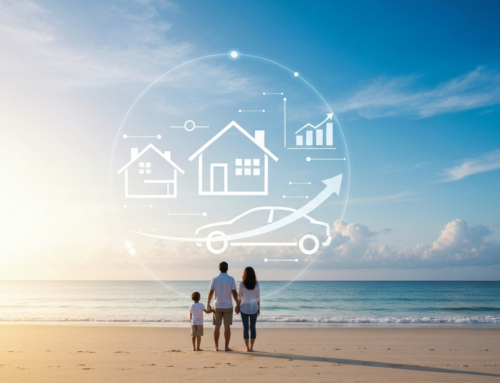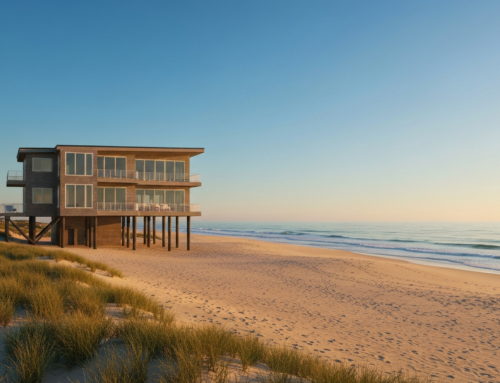Understanding the Rising Tide: Homeowners Insurance in 2025
Many homeowners across the United States are asking: why did my homeowners insurance go up in 2025? The answer is complex, driven by a confluence of macroeconomic forces, climate-related events, and individual policy factors. Homeowners insurance premiums have been steadily climbing, with a significant 24% average increase over the past three years (2021-2024) and an 8.7% rise faster than the rate of inflation between 2018 and 2022, according to the U.S. Department of the Treasury. This trend is projected to continue, with Insurify anticipating an average 8% national increase in 2025 alone, impacting residents in every state.
Unpacking the Macro Reasons: Why Did My Homeowners Insurance Go Up in 2025?
Several large-scale factors contribute to the escalating cost of homeowners insurance. These are often beyond an individual homeowner’s control but profoundly affect the insurance market.
Climate Change and the Surge in Severe Weather Events
One of the most significant drivers of rising homeowners insurance costs is the increasing frequency and intensity of climate-worsened extreme weather events. Catastrophes like wildfires, floods, hurricanes, and severe convective storms are causing more damage than ever, even in areas not traditionally considered high-risk. From 2018 to 2022, homeowners in the 20% of ZIP codes with the highest expected annual losses from climate-related perils paid 82% more in premiums than those in the lowest risk areas, notes a major report from the U.S. Department of the Treasury. States like Florida, Louisiana, and California, prone to hurricanes and wildfires, have seen some of the most dramatic increases and insurer withdrawals. The damage from Hurricane Ian in 2022, followed by Helene and Milton in 2024, transformed places like Sanibel Island from an insurer’s dream to a financial nightmare, underscoring the growing impact of climate change on home insurance.
The increasing losses lead insurers to raise rates to cover claims and to bolster their capital reserves or purchase more reinsurance, which itself becomes more expensive as global climate risks rise. This ripple effect means that even if you haven’t directly experienced a climate event, you’re likely paying for some of the costs of these widespread disasters.
The Economic Impact: Inflation, Construction Costs, and Labor Shortages
Beyond climate, economic factors play a crucial role. Since 2020, inflation, supply chain disruptions, and a shortage of skilled labor have significantly increased the cost of construction materials and wages for repair work. The cumulative replacement costs for home repair increased by 55% between 2020 and 2022, significantly outpacing general inflation. This directly impacts dwelling coverage, which is designed to cover the cost of rebuilding or repairing your home. When it costs more to rebuild, insurance premiums must rise accordingly. Experts caution that new tariffs could further exacerbate these costs, especially for essential materials like lumber, cement, and steel.
Market Dynamics: When Insurers Adjust Coverage or Exit Regions
As insurers face heightened losses and increased risk, many are reevaluating their strategies. This has led to some companies reducing coverage options, implementing stricter underwriting criteria, or even entirely exiting high-risk markets in states like Florida, California, and Louisiana. When fewer insurers operate in a region, the remaining ones often raise rates to reflect both higher demand and increased risk exposure. This dynamic can leave homeowners with limited choices, sometimes forcing them onto “insurers of last resort” or state-run plans, which often come with higher costs and more limited coverage. For example, in California, new regulations are being finalized in 2025 that mandate insurers using wildfire catastrophe models to write more policies in wildfire-distressed areas, aiming to expand coverage options for consumers.
Personal Factors That Can Increase Your Home Insurance Premium
While macro trends largely dictate the overall market, individual circumstances and actions can also influence your specific homeowners insurance rates.
Your Claims History and Recent Policy Changes
Filing a claim often leads to an increase in your premium. Insurers view past claims as an indicator of future risk. The severity and type of claim, along with your personal claims history, all play a role. For instance, liability claims or frequent small claims can signal higher risk, leading to surcharges that can last for several years. It’s why many insurance experts suggest carefully considering whether to file a claim for minor damages, especially if the cost is close to your deductible.
Home Upgrades, Liability Risks, and Their Influence on Rates
Certain home improvements, while adding value, can increase your insurance premiums. Additions like swimming pools or trampolines are often deemed “attractive nuisances” by insurers, significantly increasing liability risks. Conversely, renovations that enhance safety and reduce risk, such as installing a new, impact-resistant roof, upgrading outdated electrical and plumbing systems, or adding security systems and smart home devices, can actually lead to discounts. It’s crucial to inform your insurer about significant renovations to ensure adequate coverage and to explore potential savings. An independent agent from Beach Insurance LLC can help assess these changes and their impact on your policy, as well as ensure you have comprehensive coverage for your personal insurance needs.
Smart Strategies to Help Reduce Your Homeowners Insurance Costs
Despite the rising tide of premiums, homeowners have several actionable strategies to potentially lower their costs.
- Shop Around Annually: Insurance rates vary significantly between providers. Obtaining quotes from multiple companies each year can reveal substantial savings for the same coverage.
- Increase Your Deductible: Opting for a higher deductible, the amount you pay out-of-pocket before your insurance kicks in, can noticeably lower your premium. Ensure you have sufficient emergency funds to cover this higher amount if a claim arises.
- Bundle Your Policies: Many insurers offer multi-policy discounts if you combine your homeowners insurance with other policies, such as auto insurance. This can lead to significant savings.
- Enhance Home Security and Disaster Resistance: Installing protective devices like smoke detectors, burglar alarms, and automatic water shut-off systems can qualify you for discounts. Similarly, making your home more resilient to natural disasters, such as reinforcing your roof or adding storm shutters, can also lead to lower rates.
- Maintain a Good Credit Score: In most states, insurers use credit-based insurance scores to determine premiums. A strong credit history often translates to more favorable rates.
- Review Your Coverage Limits: Periodically assess your dwelling coverage and personal property limits. Ensure they accurately reflect your home’s current rebuilding costs and the value of your possessions, but avoid over-insuring.
- File Claims Sparingly: While insurance is there for major losses, consider paying for minor repairs out-of-pocket to avoid potential premium increases from small claims.
The Power of an Independent Agent Like Beach Insurance LLC
Navigating the complexities of homeowners insurance, especially amidst rising rates and evolving market conditions, can be challenging. An independent insurance agent, like those at Beach Insurance LLC, can be an invaluable resource. They work on your behalf, comparing policies and discounts from multiple carriers to find the best coverage at a competitive price tailored to your specific needs. They can also explain intricate policy details, such as the nuances of your hurricane deductible, and help you understand how home improvements and personal factors impact your rates.
Navigating Your Homeowners Insurance for a Secure Future
The landscape of homeowners insurance is undeniably dynamic, influenced by global climate patterns and economic shifts. Understanding why did my homeowners insurance go up in 2025 is the first step toward proactive management. By staying informed about the macro drivers and actively implementing smart strategies to reduce personal risk and premiums, homeowners can better secure their most valuable asset against future uncertainties. The goal is to find a balance between comprehensive protection and affordability, ensuring peace of mind even in a changing world.
Ready to navigate the complexities of homeowners insurance? Visit our Contact Us page to get personalized assistance today.






